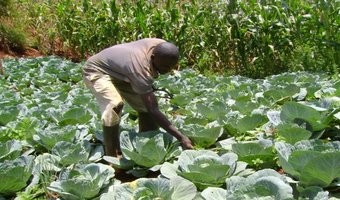
Horticulture farmer weeding his cabbage crops. Mixed farming cushions farmers from sudden drastic weather or market changes. Photo: nmcorpkenya
As other growers in Migori County were thrown into hopeless and uncertainty after tobacco buying company - Alliance One Limited- shifted its focus to other markets last year, mixed farming cushioned Gilbert Boke from the sudden shock.
Boke has been a tobacco farmer since 2012, but from 2015, he decided to incorporate horticultural farming to diversify on income as the tobacco market turned turbulent.
“I started growing vegetables and tomatoes because our tobacco produce could overstay in store before collection and sometimes payments delayed,” said Boke.
Indeed, his predication came through in May 2016 when Alliance One Limited exited Kenyan market to Uganda and Zimbabwe, citing low leaf quality in the country.
This left more than 10,000 farmers in his home county stranded with their produce.
At that time Boke had half an acre on tobacco and the rest of his four acre land on cabbages, tomatoes, spring onions and indigenous vegetables.
To him the exit of the tobacco firm was more of a relief. He destroyed the four structures where he dried the tobacco leaves after selling everything out. He realised Sh5000, which he used to expand his horticulture farm.
“After destroying my two tobacco stores and two drying chambers, I sold materials to scrape material brokers, added some money and invested all in vegetable and tomato farm,” said Boke.
In total Boke used close to Sh70, 000 to beef up his horticultural farming.
He divided his four acres into four sections. Cabbages and tomatoes in one and half acres each. Then spring onions and indigenous vegetables on half an acre each.
“With certified inputs, consultation from agricultural extension officers as well as visiting demonstration farms and agricultural shows, I have witnessed good harvest,” he said.
In 75 days after planting Boke would start harvesting his Gloria F1 cabbage. His one and half acre carries more than 2, 000 cabbages, which he will harvest in three phases. The main market for his cabbages are Migori, Isebania and Kehancha towns. However, most of his indigenous vegetable are sold within his Nyanchabo village, Kuria West.
A bag of cabbage of 50 kilogram costs Sh3, 000. During abundant rain Boke harvests up to 85bags of 50kg each. This translates to Sh255, 000 gross income.
He harvests 200-250 tomato boxes, which sells between Sh2, 500 and Sh3, 000 to make close to Sh1.2 million net income. The harvest depends on the rain.
The indigenous vegetables are sold to locals who consistently call in to ask for different quantities. He takes the surplus to the local business centres.
Spring onions is another big catch of cash. A sack of 50kg spring onions sells at Sh850 to traders from Daraja Mbili market in Kisii County.
With his close to Sh1.5 million in about five months, Boke is glad that he is able to manage his bill and school fees for his children. This has also seen him become one of the talked about agriculture entrepreneurs in the area.